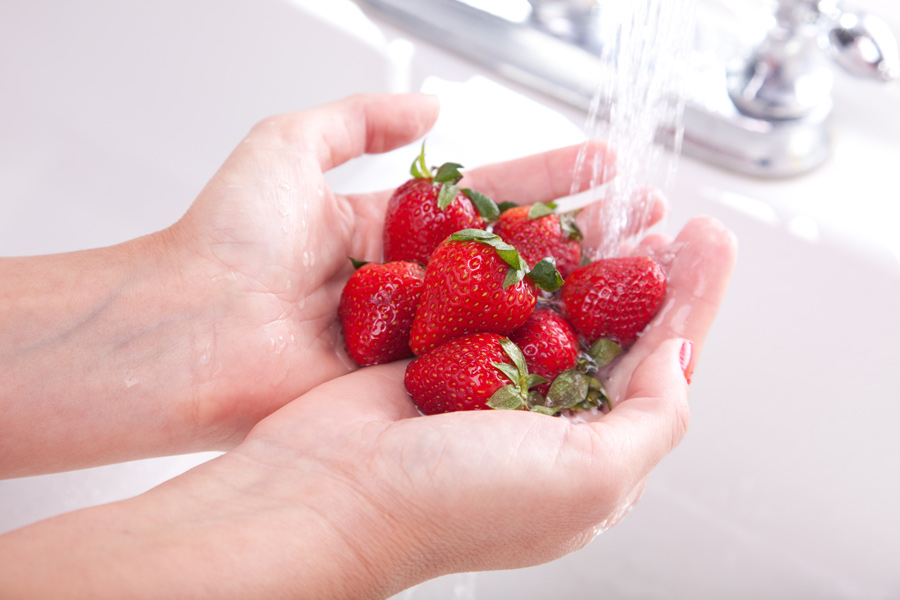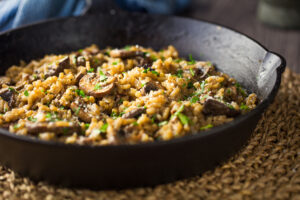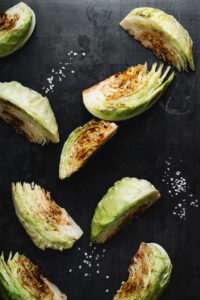Fruits and vegetables are important for a healthy diet, but they quite literally go from farm-to-table to get to you — and who knows if that journey included a pit-stop on the grocery-store floor. So how should you wash your produce when you get it home? There are many myths swirling around — and we’re debunking the most popular ones.
Myth: Produce Spray or Soap Is the Best Way to Clean Your Fruits and Vegetables
Fact: According to the Food and Drug Administration (FDA), washing fruits and vegetables with soap, detergent or commercial produce wash is not recommended. The Centers for Disease Control and Prevention (CDC) also doesn’t recommend washing fruits and vegetables with soap, detergent or commercial produce wash. Soap or detergent residues can stay on produce. The FDA has not evaluated the safety of residues left from soaps and detergents if ingested.
Myth: You Need to Wash Pre-Washed Produce
Fact: Many pre-cut, bagged, or packaged fruit and vegetables are pre-washed and ready to eat. This will be written on the package and you can use the contents without any further washing — the guidelines used in the packaging facilities are extremely stringent. If you do wash the produce, you have a greater chance of contaminating it because you’ll take it into multiple spots around your kitchen — including a splashy sink.
Myth: Use Diluted Bleach to Destroy Any Germs on Fresh Produce
Fact: Bleach can destroy harmful microorganisms, but it should not be ingested! You should never wash your produce with bleach or a diluted bleach solution.
How To Wash Your Produce
The Partnership for Food Safety Education, recommends cleaning produce properly by gently rubbing it under cold running water. If you do have a tough exterior to your produce, like melon or pineapple, use a clean stiff bristled brush under running water.
The CDC gives even more detail regarding washing fresh produce. They recommend cleaning fruits and vegetables before eating, cutting, or cooking unless the package says the produce have been washed (like packaged triple washed baby spinach). They also recommend washing or scrubbing the produce under running water even if you won’t be eating the peel as dirt or germs on the skin can get inside the fruits and vegetables when you cut them. Also, cut away any damaged or bruised areas before preparing or eating. Afterwards, you may dry fruits and vegetables, using a clean paper towel.
If you’re working with something like spinach, leeks or other leafy greens which can have a lot of dirt, place the produce in a large bowl of cold water, swish it around to remove the grit, lift it out, and drain in a colander. You want to make sure you don’t dump the gritty water back onto the food; try setting the colander inside the bowl so you can easily lift the leaves out. If there is still grit left on the food, then repeat the process.
Toby Amidor, MS, RD, CDN, is a registered dietitian and consultant who specializes in food safety and culinary nutrition.
Strawberries
The strawberry is a small plant that belongs to the Rose family. Strawberry plants may appear to grow on vines, but they produce runners, or daughter plants, that mimic vine growth. These runners help the strawberry spread across a garden. Strawberries can be grown wild or as a cultivated plant.
How Do I Make A Good Selection?
Choose strawberries that are firm, shiny, and brightly colored. Strawberries should be free from bruising and mold. Harvest or choose ripe berries as they do not ripen after being picked.
What Is The Proper Storage?
Store unwashed strawberries in their original container, or in a paper-lined container covered with plastic wrap in the refrigerator for 1-3 days.
Why Should I Eat This?
Strawberries contain vitamin C, which helps heal cuts and wounds. They are a good source of potassium, which helps with muscle contractions and regulating fluid balance in the body. Strawberries also have folate, which is important for women who are pregnant, as it plays an important role in preventing birth defects.
How Could I Use More Strawberries?
- Add sliced strawberries to a salad
- Make a fruit salad using strawberries
- Top ice cream with fresh sliced strawberries
- Add sliced strawberries to cereal or oatmeal
- Top yogurt with sliced strawberries
- Add to the batter, or top pancakes or waffles with strawberries
- Add to a smoothie
- Add cut strawberries to baked goods and other desserts like pies
- Make jams and jellies
- Blend or mash strawberries and add to lemonade






